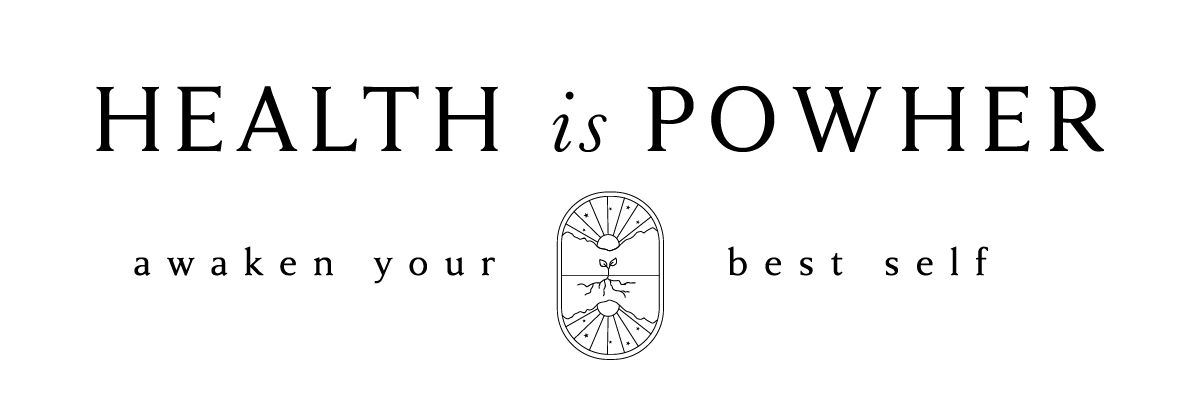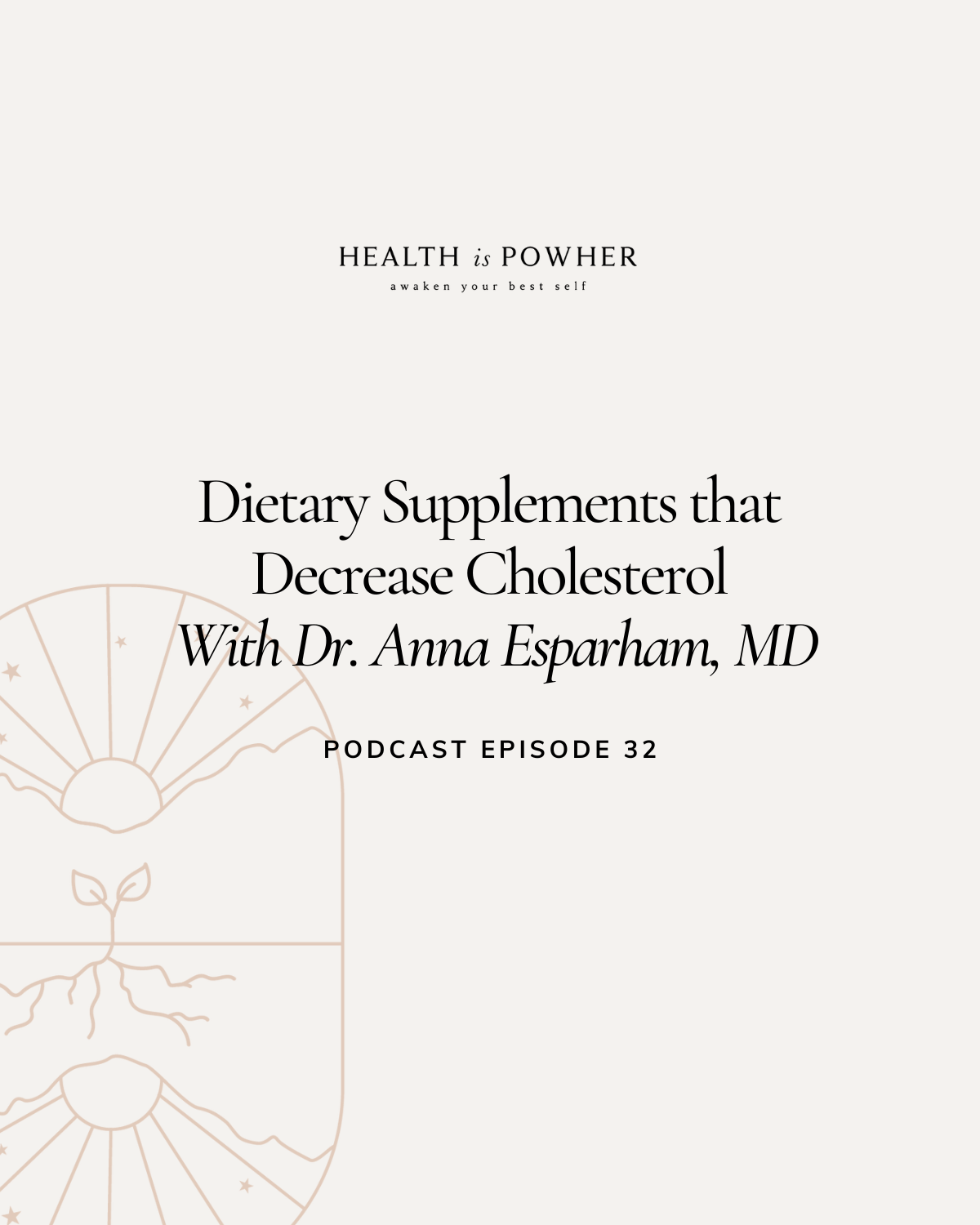Dietary Supplements that Decrease Cholesterol
Hello Everyone and Welcome to the HIP: Health Is PowHer podcast Episode #32!
This episode I’m soo excited to talk about cardiovascular disease and how we can combine last week's episode on nutrition with dietary supplements that decrease cholesterol to prevent risk of stroke, coronary artery disease, heart attack, hypertension and other complications from high cholesterol and oxidative stress or inflammation.
Last episode (HIP Podcast Episode 31) Randy Evans, our Master’s Level Integrative Dietitian, talked about how we can use nutrition to prevent and possibly treat high cholesterol and dyslipidemia.
Today we’re going to discuss the dietary supplements for high cholesterol and dyslipidemia, though this is not all inclusive unfortunately. It’s such a vast topic and it would take me weeks to get through this :) So we’ll have sequels!!!
So just to recap last week’s episode, Randy discussed that it is tough to absorb that much cholesterol or saturated fats to influence serum lipids and heart disease risk.
What’s more important at reducing risk is lowering refined carb intake such as sugars bread, processed foods. In addition, eating more healthy fats such as extra virgin olive oil and omega-3’s have a favorable effect on lipids. I highly encourage you to listen to both episode 8 and episode 31 as Randy just makes it so incredibly simple when he breaks down how to eat healthy for life. It’s not as hard as you think!
Dyslipidemia or a problem with our cholesterol and fats (triglycerides) is one of the top risk factors for cardiovascular disease (along with diabetes, smoking, obesity, and hypertension).
There are so many contributors of dyslipidemia that we’re going to outline in this podcast and how we can use self-care approaches to prevent severe disease from occurring!
With the current healthcare state, it is more timely than ever to learn how to stay healthy and prevent disease. None of us wants to be sick or pay ungodly amounts of money for tests, procedures, medicines or surgery.
So let’s get in to the easy part - taking supplements is still relying on an outside force to heal us instead of our own capacity for healing, but you know what we can take all the help we can get.
Besides with the recent evidence that states that statins don’t really prevent risk of stroke, heart attack, or death like we once thought, it’s important to arm ourselves with other possibilities to stay well.
Dietary Supplements:
Berberine:
Berberine is a small compound found in goldenseal, barberry, Oregon grape, and tree turmeric, and more…
Berberine is known for its antimicrobial benefits - people have often taken this for SIBO or SMall Intetinal Bacterial overgrowth, gut dysbiosis, or as part of their regimen for candida overgrowth.
But it has also been found to decrease insulin resistance, lowers excessive glucose and hemoglobin A1C, and improve lipid profile!
Oral administration of BBR in 32 hypercholesterolemic patients for 3 months reduced serum cholesterol by 29%, triglycerides by 35% and LDL-cholesterol by 25%. It does this by some other mechanism that the traditional statins.
In addition, it was found to improve androgen levels and LH/FSH ratios in women with PCOS even better than metform in a systematic review!
Red Yeast Rice
Red yeast rice has come under scrutiny from the FDA when several supplements were found to contain varying contents of Monakolin K which is just like Lovstatin (another statin). So in actuality, red yeast rice acts like a statin so if people have trouble with statin side effects or are cautious with regards to taking statins, then red yeast rice may not be right for you.
Aged garlic
Garlic supplementation reduced blood pressure and total cholesterol in one large systematic review and meta-analysis!
A few small studies that used AGE also showed favorable effects on inflammation. Although garlic is generally safe, there may be a lot of gut reactions like burping, heartburn, indigestion!
Quercetin:
Quercetin, one of the most widely distributed flavonoids in plants (think onions!!), has been demonstrated to reduce hyperlipidaemia and atherosclerotic lesion formation.
I haven’t found any major human trials, but there has been several studies on quercetin’s effects on decreasing cholesterol through changing cholesterol transport mechanisms in the body.
I actually love quercetin for its anti-inflammatory and possibly anti-viral properties! I actually used quercetin for my father who developed COVID-19 for 6 weeks and when I read an in vitro study that quercetin blocked viral replication of coronavirus.
Quercetin has a theoretical capability to interfere with SARS‐CoV‐2 replication and hopefully will be studied in the future for protection against COVID-19 (me praying!!!)
Resveratrol:
Resveratrol is a polyphenol found in grapes, red wine, and berries (and more!). We do know there’s a small benefit of small amounts of wine (I have found Dry Farm Wines - very clean low alcohol low sugar wines) that prevent risk of stroke!
Resveratrol has been found to provide antioxidant, anti-inflammatory, antifibrotic, and cardioprotective properties.
It may reduce cholesterol efflux and alter metabolism through changes in the gut microbiota. Most of these studies are animal studies so it will be interesting to see what happens next in human trials.
Omega-3’s:
it can significantly reduce triglycerides. But just a reminder that triglycerides are typically elevated because of too many carbohydrates in the diet (meaning sugar and processed/packaged carbohydrate foods).
Omega-3's may also reduce cholesterol through reverse cholesterol transport mechanisms in the body (meaning that it hopefully prevents build-up of cholesterol where it shouldn't be in the vessels).
I love Wiley’s finest Omega-3's- as they have really good manufacturing practices (at least they did!), just of course they still cause belching/indigestion for me personally. But I’ve found Xymogen Omega-3’s anecdotally doesn’t cause as much side effects from Omega-3’s. And I don’t have any affiliation with them during the production of this podcast episode.
Niacin
Niacin is tricky. Niacin generally leads to increases in high density lipoprotein (HDL) in several studies. But it has not been found to decrease mortality rates or lowers risk of heart disease.
However, in a study of 39 people with fatty liver disease, niacin reduced liver fat by 47% and reduced inflammation in the body as well! They had to take niacin extended-release for 6 months though...
That about wraps up this episode, hopefully enlightening you regarding the possibilities of pills other than statins that may potentially help decrease dyslipidemia and inflammation!
Please don’t forget to hit subscribe on iTunes, Stitcher, or Spotify, and by rating and reviewing us (leaving us a nice little note on the platform with hopefully 5 stars) helps us further our mission by spreading the word to other women in need of this information. We review the evidence for you and provide it for free through this platform, but it is a true labor of love and need your support!
Also, if you haven’t yet followed us over on instagram or facebook @health_is_powher and join our free private facebook group. P.S. you have a team of an integrative wellness physician, a holistic nurse and personal trainer, and a Master's Level Integrative Dietitian when you join.
You can subscribe to our email list as we just wrapped up the HIP December 6-day self-Care Challenge , we are providing Randy Evans’ healthy fats sheet that lists many of the anti-inflammatory healthy fats you should be eating as part of your nutrition lifestyle!
Just head on over to www.healthispowher.com and enter your email

